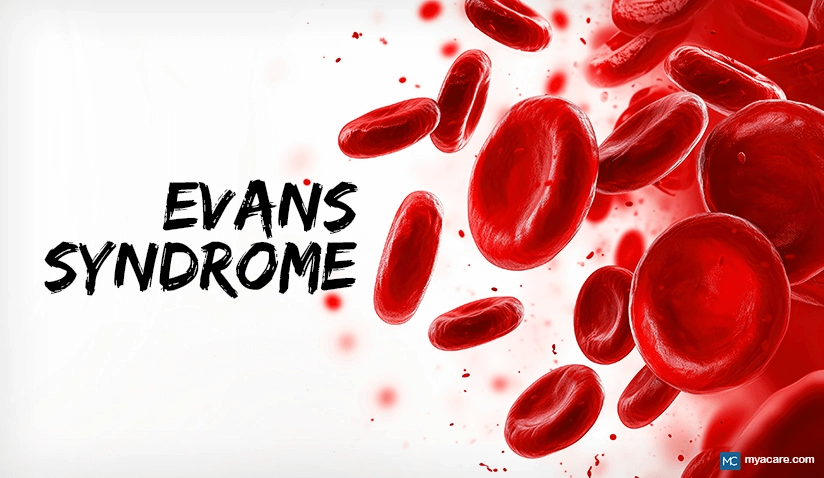What Is Evans Syndrome? Causes, Diagnosis, and Treatment

Medically Reviewed by Dr. Rae Osborn, Ph.D. - August 14, 2024
Evans syndrome is a rare autoimmune disorder that affects the body's ability to produce blood cells. It comprises two or more types of cytopenia, a condition in which the number of mature blood cells in the bloodstream declines, leading to deficiencies in red blood cells, white blood cells, and platelets.
Evans syndrome is named after Dr. Robert Evans, who described the condition in 1951. The prevalence is unknown, yet it is a rare disease that is estimated to affect children and adults over the age of 52.[1] It is more common in females than males, with a ratio of 3:2.
This article aims to cover what causes Evans syndrome, the diagnostic process, and the treatment options available.
What is Evans Syndrome?
In Evans syndrome, the body's immune system mistakenly attacks and destroys its red blood cells and platelets, leading to autoimmune hemolytic anemia (AIHA), immune thrombocytopenia (ITP), and an increased risk of bleeding. Some individuals may also have neutropenia, where white blood cell levels are low in number.
Unlike AIHA and ITP, the underlying events in Evans syndrome attack red blood cells and platelets instead of only one or the other. This makes treatment more difficult, as blood cells are sometimes destroyed during transfusions in Evans syndrome patients, yet not in ITP or AIHA patients.
What Causes Evans Syndrome?
The exact cause of this autoimmune process is not fully understood, yet it is likely linked to genetic and environmental factors.[2]
Scientists have observed that deficiencies in various immune-related proteins may contribute to Evans syndrome. This includes the CTLA-4 and LRBA proteins, which act as immune system breaks, inhibiting the activation of T lymphocytes (T cells) after an infection or similar event. Deficiencies in these proteins may cause immune dysregulation in Evans syndrome, which is a characteristic of excessive T cell activation. T cells inform B cells of an immune event, promoting the release of antibodies. In Evans syndrome, B cells overproduce autoantibodies against red blood cells, platelets, and sometimes neutrophils (another type of white blood cell).
Deficiencies in TPP2 and a lower ratio of anti-inflammatory lymphocytes, called T helper cells, may also play a role in causing Evans syndrome.
These protein deficiencies may occur due to gene mutations. In secondary Evans syndrome, other genes are more likely to play a role. More research is required to confirm the true underlying causes of Evans syndrome.
Types of Evans Syndrome
There are two main types of Evans syndrome based on the underlying cause:
- Primary Evans syndrome: Also known as idiopathic Evans syndrome, this type is the most common, occurring when the immune system assails the body's cells without any known trigger or obvious underlying condition.
- Secondary Evans syndrome: This type arises due to an underlying condition or trigger, such as:
- Systemic lupus erythematosus
- Autoimmune lymphoproliferative syndrome
- Sjogren’s syndrome
- IgA deficiency[3]
- Common variable immunodeficiency
- Older non-Hodgkin lymphoma
- Chronic lymphocytic leukemia
- Viral infections like HIV and Hepatitis C
- Post allogeneic hematopoietic cell transplantation
Risk Factors
The following risk factors are associated with a higher chance of Evans syndrome development:
- Family history of autoimmune disorders
- Certain gene mutations associated with immune deficiency[4]
- Exposure to certain medications or chemicals
- Infections, such as hepatitis C or HIV
- Other autoimmune disorders such as systemic lupus erythematosus (SLE)
Symptoms of Evans Syndrome
Evans syndrome is more prevalent in children and young adults. It is advisable for parents to know the symptoms of Evans syndrome in the event their children contract the condition and require immediate medical attention. Many children with Evans syndrome can achieve remission and live a normal life with proper treatment.
The symptoms of Evans syndrome may vary. The most common ones include:
- Fatigue
- Shortness of breath
- Pale skin
- Dizziness
- Jaundice
- Petechiae (small red or purple spots on the skin)
- Easy bruising or bleeding
- Enlarged spleen
- Enlarged lymph nodes
- Recurrent infections
- Fevers
- Mouth sores
In rare cases, Evans syndrome ITP can cause a serious hemorrhage that is potentially life-threatening. Severe cardiovascular problems culminating in heart failure may also affect those with the condition and are more prevalent in those over 60 years of age.
Pregnancy can be challenging for individuals with Evans syndrome, as it increases the risk of complications for both the mother and the baby, such as autoimmune reactions against the child and internal bleeding. It is critical to discuss pregnancy ahead of time with a specialist who can provide guidance and monitor your condition closely.
Diagnosis of Evans Syndrome
Diagnosing Evans syndrome presents challenges to any physician, as it shares symptoms with other blood disorders. A thorough medical history, physical examination, and blood tests are usually required to make a diagnosis.
Some standard tests used to diagnose Evans syndrome include[5]:
- Complete blood count: This test measures blood quantities of red blood cells, white blood cells, and platelets.
- The Coombs test: A blood test used to detect antibodies that attack red blood cells, helping to diagnose autoimmune hemolytic anemia by identifying the cause of the anemia.[6]
- Reticulocyte count[7]: This measures how quickly new red blood cells called reticulocytes, are formed.
- Flow cytometry: This is a test that analyzes the different types of cells in the blood and determines if there are any abnormalities.
- Bone marrow biopsy: A biopsy involves taking a small sample of bone marrow to examine the production of blood cells.
Treatment Options for Evans Syndrome
Evans syndrome treatment is based on the patient's general health and the severity of the condition. It may require a team of dedicated healthcare professionals, including surgeons, hematologists, and rheumatologists to help the patient manage symptoms.
The main purpose of treatment is to repress the immune system and spare an autoimmune attack on the body's cells.
Some standard treatment options for Evans syndrome include[8]:
- Immunosuppressive therapy: This stifles the immune system in individuals with Evans syndrome, potentially slowing the rapid bone turnover that leads to deformity.
- Corticosteroids: This can reduce inflammation and manage symptoms of Evans syndrome.
- Intravenous immunoglobulin: This therapy helps regulate the immune system in Evans syndrome patients.
- Monoclonal antibodies and other immunosuppressant medications: These may manage Evans syndrome and its symptoms. Of particular interest are:
- Rituximab, a monoclonal antibody, is sometimes used in treating Evans syndrome as it can affect specific cells or proteins in the immune system and help prevent them from attacking the body's cells.
- Those not responding to rituximab or corticosteroids may benefit from cyclosporin A, mycophenolate mofetil, cyclophosphamide, azathioprine, or sirolimus.
- Splenectomy, or surgical spleen removal: This is a treatment option for some individuals with Evans syndrome[9]. The spleen is responsible for removing antibody-producing cells that may contribute to the condition. However, the results of performing splenectomy are variable among patients and the procedure is not without risks, such as bleeding, scarring, and infection.
- Hematopoietic stem cell transplantation[10]: This has sometimes been used in a few patients when no other treatments will work. More research is needed on this treatment option.
Sometimes, a blood or platelet transfusion may help alleviate symptoms during an acute episode but, in general, transfusions are not the best treatment option[11].
Prognosis
The prognosis for Evans syndrome varies from person to person and depends on the severity of the condition and the individual's overall health. With proper treatment, many individuals with Evans syndrome can control their symptoms and live a fulfilling life. However, some may experience relapses or complications, such as infections or bleeding.
Evans Syndrome Management
Managing Evans syndrome involves a combination of medical treatment and lifestyle changes. Some tips for managing Evans syndrome include:
- Follow a treatment regimen as prescribed by a specialist.
- Get routine check-ups and follow-up blood tests to monitor the condition.
- Consume a healthy, well-balanced diet that supports the immune system.
- Avoid any activities that elevate the risk of bleeding, such as contact sports.
- Get sufficient rest and address stress to support immune function.
Latest Research Advancements in Evans Syndrome Treatment
While there have been significant advancements in the treatment of Evans syndrome, research is scarce and slow, often focusing on treating individual conditions like immune thrombocytopenia and autoimmune hemolytic anemia.
Stem cell transplantation has been an active area of study, holding potential as a cure for Evans syndrome. It involves replacing faulty bone marrow that contains faulty reactive immune cells and blood cells with healthy bone marrow loaded with new stem cells. In a few cases, this has induced remission.
More research is required to confirm its safety and efficacy in treating patients with Evans syndrome.
Other active developments revolve around potential monoclonal antibody treatments, immunotherapies, and uncovering more about the genetics underlying the condition. In the future, specific biomarkers, genetic testing, molecular therapies, and comprehensive immune system regeneration may help to alleviate episodes and symptoms in those with the syndrome.
Conclusion
Evans syndrome is a rare autoimmune disorder that affects the body's ability to produce blood cells. Its defining features are the simultaneous presence of autoimmune hemolytic anemia (AIHA) and immune thrombocytopenia (ITP). While the precise mechanism is not clear yet, advancements in treatment options have improved prognosis for individuals with Evans syndrome. With appropriate therapy and management, many individuals with Evans syndrome can achieve remission and thrive in their daily lives. It is important to get medical help for an accurate diagnosis and course of treatment if you or a loved one is exhibiting signs of Evans syndrome.
To search for the best healthcare providers worldwide, please use the Mya Care search engine.
The Mya Care Editorial Team comprises medical doctors and qualified professionals with a background in healthcare, dedicated to delivering trustworthy, evidence-based health content.
Our team draws on authoritative sources, including systematic reviews published in top-tier medical journals, the latest academic and professional books by renowned experts, and official guidelines from authoritative global health organizations. This rigorous process ensures every article reflects current medical standards and is regularly updated to include the latest healthcare insights.

Dr. Rae Osborn has a Ph.D. in Biology from the University of Texas at Arlington. She was a tenured Associate Professor of Biology at Northwestern State University, where she taught many courses to Pre-nursing and Pre-medical students. She has written extensively on medical conditions and healthy lifestyle topics, including nutrition. She is from South Africa but lived and taught in the United States for 18 years.
Featured Blogs



